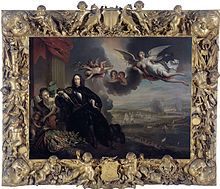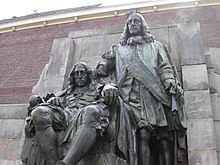Cornelis de Witt

Cornelis de Witt's signature:
Cornelis de Witt (born June 15, 1623 in Dordrecht , † August 20, 1672 in The Hague ) was a well-known Dutch politician and military.
Life
family
Cornelis de Witt came from the old Dordrecht rulers of the De Witt . His parents were Jacob de Witt and Anna van den Corput (a niece of Johannes Corputius , the famous Dutch military leader and cartographer ). His uncle Andries , like his younger brother Johan de Witt - the famous Dutch statesman - had been a councilor of Holland . At the height of the Dutch Golden Age , the De Witt brothers, together with their relatives Andries Bicker and the brothers Cornelis and Andries de Graeff, were able to dominate the Dutch government apparatus.
Political career in the golden age
Cornelis de Witt was 1648-1667 councilor , after reigning mayor and retiree his hometown, and a Dutch naval officer. He was also a councilor to the Admiralty of Rotterdam and Ruwaard (regent) of Putten . Because of his maritime knowledge and the protégé of his brother Johan, he was the Dutch naval commander in the Anglo-Dutch naval wars from 1652 to 1654 and from 1665 to 1667. During the raid on the Medway in 1667, Cornelis de Witt was in control of the Dutch armed forces.
The Rampjaar 1672
The pro-French policy of the De Witt brothers failed when Louis XIV attacked the Republic of the United Netherlands by military means in Rampjaar in 1672. Cornelis de Witt led the naval battle of Solebay , where he showed great personal courage. Due to the battle success of the French troops, which threatened the center of the republic, the Orange-minded party succeeded in bringing down the state-minded (city) rulers when Johan de Witt was lying on his sick bed due to an assassination attempt. Cornelis de Witt, in his capacity as council member of Dordrecht, was asked to withdraw the Eeuwig edict drawn up in 1667 , which forever excluded the House of Orange from government affairs in the Netherlands, which he added with the addition vc (Vi Coactus, Latin for under duress ) did (he was then forced to cross this out again). Then the time of the House of Nassau began in Holland , because Wilhelm III. of Orange was elected as the new governor and with it the old pensioner of Holland, Johan de Witt , overthrown. In August, Cornelis de Witt was based on the testimony of the oranisch-minded barber Willem Tichelaar of the murder plot against Wilhelm III. indicted as part of a conspiracy that targeted Johan de Witt through Cornelis. De Witt was imprisoned in Gevangenpoort in The Hague and severely tortured there. Under the leadership of the President of the Court, Adriaen Pauw , de Witt, against whom there was no evidence and who persevered under torture, was released and banished from the country. When his brother tried to pick him up from prison on August 20, lured by a fictitious letter, the two brothers were cruelly murdered by a mob incited by the Orange partisans who accused them of conspiracy against the new governor. The people were panicked by the French invasion, which was only stopped by the flooding of the dikes, and revolts broke out everywhere for William of Orange, from whom it was hoped that the country would be saved.
Individual evidence
- ↑ Biography Andries Bicker in DBNL (nl)
- ^ Herbert Harvey Rowen: John de Witt: Statesman of the "true Freedom" . Cambridge University Press, Cambridge 1986, ISBN 0-521-52708-2 , pp. 70 .
- ↑ J. Oddens: Een voor Vorstelijk country. Gerard Hinlopen op reis naar Istanbul (1670–1671). 2009, p. 42. Volgens Oddens moest hij de vloot ziek verlaten wat hem op Beschuldigingen van lafheid kwam te staan.
- ↑ J. Oddens: Een voor Vorstelijk country. Gerard Hinlopen op reis naar Istanbul (1670–1671). 2009, p. 42.
- ^ Rowen: John de Witt. Cambridge UP, 1986, p. 199.
- ↑ Cf. Maarten Roy Prak: The Dutch Republic in the Seventeenth Century: The Golden Age . Cambridge University Press, Cambridge 2005, ISBN 0-521-84352-9 , pp. 54 .
literature
- Herbert Harvey Rowen: John de Witt: Statesman of the "true Freedom" . Cambridge University Press, Cambridge 1986, ISBN 0-521-52708-2 .
Web links
| personal data | |
|---|---|
| SURNAME | Witt, Cornelis de |
| BRIEF DESCRIPTION | Dutch naval officer and older brother of Johan de Witt |
| DATE OF BIRTH | June 15, 1623 |
| PLACE OF BIRTH | Dordrecht |
| DATE OF DEATH | August 20, 1672 |
| Place of death | The hague |

